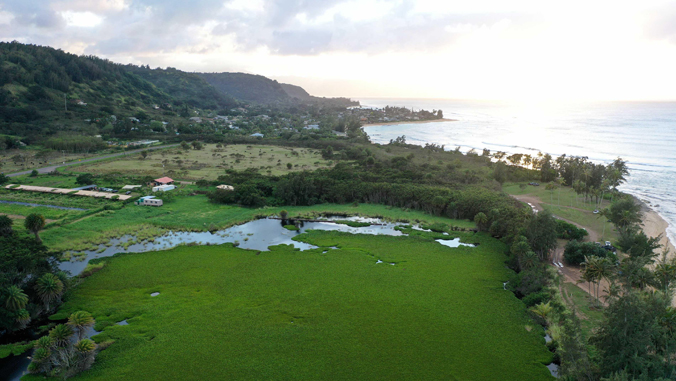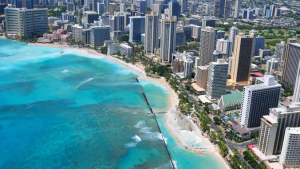
To improve coastal community resilience nationwide, NOAA’s National Sea Grant College Program announced two complementary initiatives totaling $8.1 million. Of that total, the University of Hawaiʻi Sea Grant College Program (Hawaiʻi Sea Grant) will be awarded $624,725.
Hawaiʻi Sea Grant faculty and their collaborators will lead two projects:
- improving coastal water quality across the state and forecast fecal bacteria levels in Waikīkī;
- assisting communities on the North Shore of Oʻahu to adapt to climate change, including energy, water, food sustainability, watershed restoration and more.

Margaret McManus, professor and chair of the Department of Oceanography at UH Mānoa’s School of Ocean and Earth Science and Technology is leading aspects of the water quality project. She noted “Oftentimes after storms we see brown water along our coasts. This research will allow us to determine the level of terrestrial derived sewage and fecal matter in these waters. We will be working closely with the Pacific Islands Ocean Observing System (PacIOOS) to establish initial test sites. PacIOOS has also contributed instrumentation to support this critical work.”
Kawela Farrant, Hawaiʻi Sea Grant’s newest extension faculty and lifelong North Shore resident is leading the project on the North Shore. Farrant noted “Community members and nonprofit groups in this area have a long history of advocating for natural resource protection, sustainability initiatives, climate change adaptation, and Hawaiian cultural preservation. Direct partnership with Hawaiʻi Sea Grant will provide additional financial capacity and technical expertise to initiatives that are strongly wanted, if not driven, by the local community.”
More on the projects
Through a joint competition with the U.S. Coastal Research Program (USCRP), 10 new projects were selected for a total of $3.9 million in funding to translate research into application for communities. Project activities span California, Georgia, Hawaiʻi, Michigan, New Jersey, New York, North Carolina, Oregon, Wisconsin, South Carolina and Texas. Read more about the project and access the full list of the USCRP-Sea Grant projects and descriptions.
Sea Grant programs across the nation received an additional total of $4.2 million in Sea Grant funds to increase local capacity, engagement, research and implementation for addressing resilience challenges. Read more about the funding to develop and implement extension programming on Oʻahu’s North Shore, as well as the full list of resilience awards and descriptions awarded nationwide.
–By Cindy Knapman

